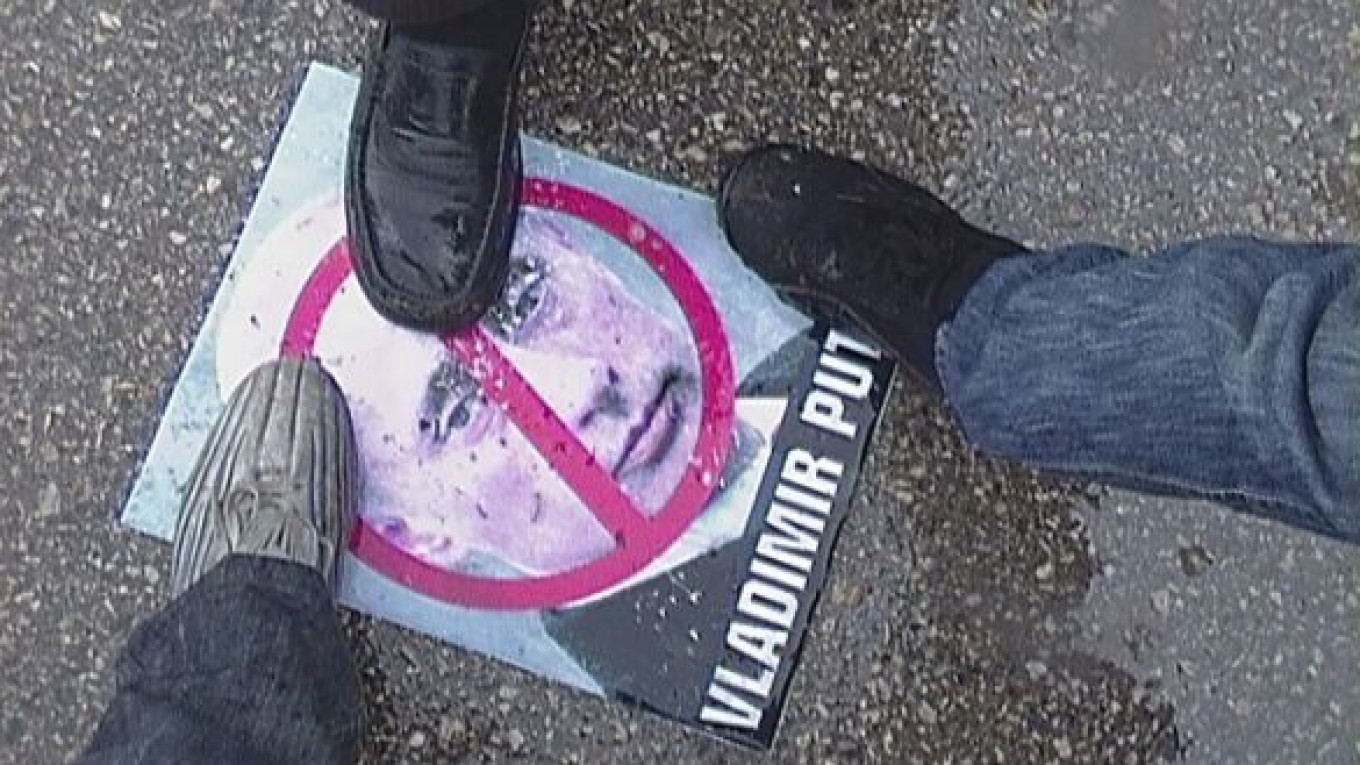Russia's defiance of international efforts to end Syrian President Bashar Assad's crackdown on protests is rooted in a calculation that it can keep a Mideast presence by propping up its last remaining ally in the region — and has nothing to lose if it fails.
The Kremlin has put itself in conflict with the West as it shields Assad's regime from United Nations sanctions and continues to provide it with weapons.
But Moscow's relations with Washington are already strained. And Prime Minister Vladimir Putin seems eager to defy the United States as he campaigns to reclaim the presidency.
"It would make no sense for Russia to drop its support for Assad," said Ruslan Pukhov, head of the Center for Analysis of Strategies and Technologies. "He is Russia's last remaining ally in the Middle East, allowing it to preserve some influence in the region."
And observers note that even as it has nothing to lose from backing Assad, it has nothing to gain from switching course and supporting the opposition.
"Russia has crossed the Rubicon," said Igor Korotchenko, head of the Center for Analysis of Global Weapons Trade.
The UN estimates that more than 5,400 people have been killed since the uprising began in March.
"Russia will be seen as the dictator's ally. If Assad's regime is driven from power, it will mean an end to Russia's presence," said Fyodor Lukyanov, editor of Russia in Global Affairs.
Syria has been Moscow's top ally in the Middle East since Soviet times, when it was led by the incumbent's father, Hafez Assad.
Ties with Damascus helped Russia retain its clout as a member of the Quartet of international mediators trying to negotiate peace between Israel and the Palestinians.
After Bashar Assad succeeded his father in 2000, Russia sought to boost ties by agreeing to annul 73 percent of Syria's Soviet-era debt.
Syria's port of Tartus is now the only naval base Russia has outside the former Soviet Union. A Russian Navy squadron made a call there this month in what was seen by many as a show of support for Assad.
For decades, Syria has been a major customer for the Russian arms industries, buying billions of dollars' worth of combat jets, missiles, tanks and other heavy weapons. And Assad's regime paid cash.
Kommersant reported this week that Syria has ordered 36 Yak-130 combat jets worth $550 million. Korotchenko said Syria needs the jets to train its pilots to fly the advanced MiG-29M or MiG-35 fighter jets it wants to purchase.
He said Syria's importance as a leading importer of Russian weapons in the region grew after the loss of the lucrative Iraqi and Libyan markets.
Russia, whose abstention in a UN vote cleared the way for military intervention in Libya, later voiced frustration with what it described as a disproportionate use of force by NATO.
The Kremlin has vowed not to allow a replay in Syria, warning that it would block any UN resolution on Syria lacking a clear ban on any foreign military interference.
Moscow accuses the West of turning a blind eye to shipments of weapons to the Syrian opposition and says it won't be bound by Western sanctions.
Earlier this month, a Syria-bound Russian ship allegedly carrying tons of munitions was stopped by officials in Cyprus, an EU member, who said it was violating an EU arms embargo.
The ship's captain promised to head to Turkey but then dashed to Syria. Asked about the ship, Foreign Minister Sergei Lavrov responded that Moscow owes neither an explanation nor an apology because it has broken no international rules.
Nonetheless, Moscow has shown restraint in its arms trade with Damascus, avoiding the sales of weapons that could significantly tilt the military balance in the region.
"Russia has taken a very careful and cautious stance on contracts with Syria," Korotchenko said.
The most powerful Russian weapon reportedly delivered to Syria is the Bastion anti-ship missile complex intended to protect its coast.
Observers in Moscow said Russia can do little else to help Assad. The chief of the Federation Council's International Affairs Committee, Mikhail Margelov, openly acknowledged that last week, saying Russia has "exhausted its arsenal" of means to support Syria by protecting it from the UN sanctions. Lukyanov said Russia would block any attempts to give UN cover to any foreign military intervention in Syria but couldn't prevent Syria's neighbors from mounting such action.
Pukhov also predicted that Russia wouldn't take any stronger moves in support of Damascus.
"Going further would mean an open confrontation with the West, and Russia doesn't need that," he said.
Russia's UN ambassador, Vitaly Churkin, said a European-Arab draft resolution on Syria circulated to the UN Security Council on Friday was unacceptable in parts, but Russia was ready to "engage" on it, Reuters reported.
A Message from The Moscow Times:
Dear readers,
We are facing unprecedented challenges. Russia's Prosecutor General's Office has designated The Moscow Times as an "undesirable" organization, criminalizing our work and putting our staff at risk of prosecution. This follows our earlier unjust labeling as a "foreign agent."
These actions are direct attempts to silence independent journalism in Russia. The authorities claim our work "discredits the decisions of the Russian leadership." We see things differently: we strive to provide accurate, unbiased reporting on Russia.
We, the journalists of The Moscow Times, refuse to be silenced. But to continue our work, we need your help.
Your support, no matter how small, makes a world of difference. If you can, please support us monthly starting from just $2. It's quick to set up, and every contribution makes a significant impact.
By supporting The Moscow Times, you're defending open, independent journalism in the face of repression. Thank you for standing with us.
Remind me later.






